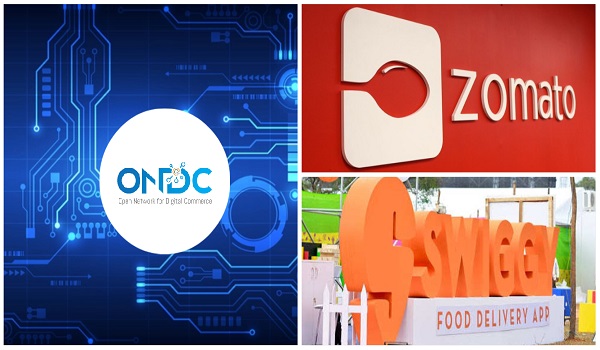ONDC, the government-backed Open Network for Digital Commerce platform, has taken social media by storm as users are admiring the platform for better pricing of products in comparison to food-delivery majors Zomato and Swiggy.
Menu items from major food chains, including McDonald’s, Taco Bell, Behrouz Biryani, Wow Momo, Pizza Hut, and Cafe Coffee Day, are available at a 30-80% discount on ONDC platforms such as Paytm and Magicpin compared to Swiggy and Zomato, and amazingly, Zomato has about a 16% stake in Magicpin.
What is ONDC? Launched in late 2021 under the Department for Promotion of Industry and Internal Trade (DPIIT) as part of the Digital India push, ONDC works as a network of interconnected e-marketplaces through which sellers, including brands, can list and sell their products directly to customers.
After a pilot in Bengaluru across 16 pin codes, the ONDC platform has gone live in multiple cities. It clocked 11,100 retail orders, its highest so far per day, on April 20, a year after its launch.
ONDC is being positioned as a major disruptor in the food delivery space as it allows restaurants to sell food directly to consumers through buyer apps.
It also charges less than half of the commissions charged by Swiggy and Zomato, which range between 18% and 25%, enabling restaurants and food chains to better price their offerings. Orders are delivered through third-party providers such as Shadowfax, Dunzo, and Loadshare for a fee paid by the restaurants.
ONDC is currently operational in 236 cities, including Mumbai, Pune, Bangalore, Noida, Kolkata, and Chennai, and according to the platform’s website, it also claims to have onboarded over 29,000 sellers, who sell more than 36 lakh products on the platform. Paytm, Phonepe’s Pincode, Meesho, Magicpin, and Mystore are among the buyer apps that have joined the platform. Alpino, Bitlsila, Bizom, BoAt, Delhivery, and Digiit are some of the seller apps live on the network, among many others.
As per a recent report by American consulting firm McKinsey, ONDC has the potential to increase India’s digital consumption by five times to around $340 billion by 2030.
How big is the threat? While the impact of the challenges posed by ONDC is yet to be determined, the threat to the Swiggy/Zomato duopoly comes at a time when both companies are dealing with mounting losses.
According to a recent HSBC Global Research note, Zomato commanded a 54% market share in the food delivery space for the October–December 2022 quarter, while Swiggy held the remaining 46%. Amid a slowdown in the food-delivery business and pressures on profitability, Zomato approached several restaurant chains in February, seeking a 2-6% increase in commissions. For the past two years, Zomato has been charging a commission of 18–25% per order for deliveries, depending on its arrangement with restaurant partners. Swiggy, on the other hand, recently announced that it has started charging a “platform fee” of Rs 2 from customers for every food delivery order in cities such as Bengaluru and Hyderabad. The platform fee is levied in addition to the delivery charge. Swiggy cofounder and CEO Sriharsha Majety, in an internal note to employees in January, said the food delivery business’s growth had not been in line with projections.
Zomato and Swiggy are also dealing with other challenges, such as multiple top-level exits and a steep fall in valuations. Like Swiggy, investor Invesco has cut the company’s valuation by 33% to $5.5 billion from $8.2 billion last October, when it first trimmed the company’s share value. Zomato, too, has seen its stock plummet over 50% since its market debut almost two years ago. Zomato’s shares plunged nearly 5% on the NSE as investors weighed the impact of ONDC on the prospects of the food-delivery platform.
For now, industry body the National Restaurants Association of India (NRAI), which represents over 500,000 restaurant brands, has also commended its single and multi-chain restaurant partners to start exploring the ONDC platform as an alternative channel but cautioned that they should consider long-term sustainability.
At this point, ONDC might be taking away the cake from the aggregators, though it is way too early to say whether ONDC would affect Zomato’s and Swiggy’s businesses. ONDC needs to ensure consumer and merchant use case satisfaction, long promotions, and zero usage costs.


